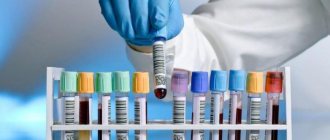A blood test for hCG (human chorionic gonadotropin) is prescribed for the purpose of early diagnosis of pregnancy, as well as if cancer is suspected. HCG is a gonadotropic hormone that normally begins to be produced in pregnant women by chorion cells from the 6-8th day of fertilization. Its main function is to stimulate the formation of the placenta. In some cases, the hormone can be produced in the body of non-pregnant women and even men in the presence of malignant hormone-producing tumors.
A blood test for human chorionic gonadotropin is one of the most accurate methods for early diagnosis of pregnancy, its accuracy reaches 98%.
There is no consensus among experts about whether elevated levels of hCG lead to cancer or, conversely, it is a consequence of them. In this regard, in many countries of Western Europe and the United States, the over-the-counter sale of dietary and homeopathic remedies that contain human chorionic gonadotropin is prohibited.
The action of pregnancy test strips is based on the determination of hCG in urine
What is hCG
The abbreviation stands for human chorionic gonadotropin . This hormone is produced from the first days of pregnancy. After fertilization, the embryo attaches to the wall of the uterus and immediately begins to secrete hCG. Gonadotropin is produced by the chorion substance, which subsequently turns into the placenta.
When pregnancy occurs, a woman's body experiences severe stress. HCG acts like corticosteroid drugs. The hormone weakens a woman's immune system . This is necessary so that the body does not reject the fetus. Thanks to the action of hCG, the embryo begins its development, and the woman carries the baby normally.
HCG also affects the genitals of the expectant mother .
The uterus and ovaries begin to work to support the development of new life. Gonadotropin acts on the corpus luteum of the ovary, and at the same time begins to produce progesterone, a hormone necessary for the normal course of pregnancy. HCG affects the gonads in male embryos. Under its influence, the reproductive system of future boys develops without pathologies.
How accurate is the analysis?
Donating biomaterial is the most reliable way to determine that a woman is pregnant.
But everywhere there is a human factor, which does not exclude errors on the part of the laboratory assistant or patient. If there was a problem with conception, appropriate medications were taken for this, the doctor must be informed about this before taking the test. Under the influence of such a factor it will be incorrect.
According to statistics, two percent of girls when examined for hCG have false positive results, which indicate cancer, hormonal disorders with pathological conditions. But negative results also occur, which indicates late attachment of the embryo to the inner surface of the uterus and abnormal pregnancy.
In our laboratory facilities you can count on correct and accurate test results. They are able to identify and study any compound or detect the accumulation of special substances in the human body. The hCG level and proper interpretation of the indicators are very important, so only a qualified doctor can do this. It is he who will give the correct conclusion, having analyzed all the available data obtained from other studies, and if necessary, correct the problem.
When can pregnancy be determined by hCG?
Gonadotropin begins to be actively released immediately after conception . Already on the 6th – 7th day from the moment of conception, the hormone level will be significantly higher than normal. All pregnancy tests and blood tests are based on the concentration of hCG.
Doctors advise taking tests for hCG on the 5th – 7th day of missed menstruation . The hormone levels rise every forty-eight hours. The normal level of human chorionic gonadotropin varies from 0 to 5 units. In 1–2 weeks after implantation it increases to 25–300 units.
Decoding the analysis results
Decoding a blood test for human chorionic gonadotropin looks quite simple. Normally, in non-pregnant women, the level of this hormone in the blood is 0–5 mU/ml. In men, its level should not exceed 2.5 mU/ml. During a normally developing pregnancy, a woman experiences a very rapid increase in hCG up to 7-11 weeks. This is reflected in the table data.
Hormone levels depending on the stage of pregnancy
| Gestation period from conception, weeks | HCG level, honey/ml |
| 1–2 | 25–156 |
| 2–3 | 101–4 870 |
| 3–4 | 1 110–31 500 |
| 4–5 | 2 560–82 300 |
| 5–6 | 23 100–151 000 |
| 6–7 | 27 300–233 000 |
| 7–11 | 20 900–291 000 |
| 11–16 | 6 140–103 000 |
| 16–21 | 4 720–80 100 |
| 21–39 | 2 700–78 100 |
Since the normal levels of the hormone in the blood may differ in different diagnostic centers, it is best to contact the specialists of the laboratory where it was carried out for a deciphering of the analysis obtained and carry out repeated studies there.
In what cases is a hCG test taken?
The most important reason for taking a test to determine the level of hCG in the blood is the presence of pregnancy. In addition, there are other indications for determining the hormone:
- amenorrhea is a condition characterized by a long delay in menstruation;
- diagnosing fetal malformations;
- suspicion of a poorly performed abortion;
- diagnosing pregnancy pathologies - ectopic, frozen or multiple pregnancies, threatened miscarriage;
- monitoring the normal course of pregnancy;
- suspicion of malignant tumors.
What does an increase in hormone levels in the blood mean?
An increase in the level of human chorionic gonadotropin in the blood of non-pregnant women and men occurs with malignant tumors of the gonads, uterus, lungs, and gastrointestinal tract organs.
During pregnancy, increased levels of the hormone are observed in the following cases:
- multiple pregnancy;
- early toxicosis;
- diabetes;
- gestosis;
- fetal chromosomal abnormalities;
- prolonged pregnancy;
- incorrectly determined gestational age;
- hydatidiform mole and relapse of hydatidiform mole.
Detection of low hormone levels in a pregnant woman is grounds for urgent referral to a gynecologist, as this may be a sign of:
- non-developing (frozen) pregnancy;
- ectopic pregnancy;
- placental insufficiency;
- threats of abortion;
- true post-term pregnancy;
- intrauterine fetal death in the II-III trimester of pregnancy.
In many Western European countries and the United States, the over-the-counter sale of dietary and homeopathic remedies that contain human chorionic gonadotropin is prohibited.
HCG norms in pregnant women
As we have already written, the normal level of human chorionic gonadotropin varies from 0 to 5 units in non-pregnant women. In the first trimester, the hormone level doubles every two days. The indicator becomes maximum at 7–10 weeks, then gradually decreases.
In the second half of pregnancy, hCG does not change significantly and is within the same limits. An increase or decrease in the indicator indicates any developmental pathologies. But the hCG level must be considered over time. It is unprofessional to judge the condition of the fetus based on the results of a single test.
HCG norms by day after ovulation
HCG norms by week of pregnancy
Norms for hormone levels are a relative concept, since most laboratories have established their own indicators . Only a qualified doctor can resolve the issue of non-compliance with the norm, find out the reasons and prescribe treatment. In these cases, self-medication is prohibited.
Danger of abnormalities for the fetus
HCG is the most sensitive marker for trisomy 21, so an increase in human chorionic gonadotropin by 2 or more times automatically places a pregnant woman at risk for developing Down syndrome in the fetus. A similar increase in the hormone is observed in Edwards, Turner, Patau syndromes, as well as in pathologies of the development of the heart and nervous system.
Attention! In 4-5% of pregnant women, the hCG level indicates the presence of possible abnormalities, but only in 0.1-0.2% of cases a child is born with genetic abnormalities. Analysis data is only a reason for further examination.
Preparing for hCG analysis
How to take a blood test for hCG? Blood is drawn from a vein in the morning only on an empty stomach . Before taking the test, it is recommended to follow the following rules:
- the day before blood sampling, you need to adhere to a special diet - exclude fatty and fried foods, alcohol;
- on the day of the test, you are allowed to drink a glass of clean still water;
- It is recommended to refrain from smoking an hour before the test,
- per day it is necessary to limit physical and emotional stress on the body;
- If a woman is taking any medications, then you should warn the doctor about this.
If there is an emergency need to be tested for hCG , then you must abstain from eating for 5–6 hours. The test can be taken independently at any medical institution; such a procedure will be paid. You can find out the hCG level for free, but only with a referral from a gynecologist.
Can blood test results be wrong?
A blood test for human chorionic gonadotropin is one of the most accurate methods for early diagnosis of pregnancy, its accuracy reaches 98%. However, there are mistakes. False positive results may be due to the following reasons:
- taking medications containing hCG (Choragon, Pregnil);
- hormonal imbalances;
- previously undetected malignant tumors.
False-negative results of a blood test for human chorionic gonadotropin may be a consequence of late ovulation and/or implantation of the fertilized egg, non-developing or ectopic pregnancy.
Video from YouTube on the topic of the article:
Increased hCG result during pregnancy
A high rate may indicate the following reasons:
- multiple pregnancy - the hormone level is proportional to the number of embryos;
- late toxicosis;
- gestosis;
- post-maturity of the fetus;
- abnormalities in child development (for example: Down syndrome);
- if a pregnant woman has diabetes,
- when taking synthetic gestagens.
Cessation of fetal development in early stages
Sometimes pregnancy is confirmed, then there are no signs or they suddenly disappear.
The dead embryo does not come out. Is there an increase in hCG when the embryo freezes? No, because it is not produced, and then its concentration drops. An ultrasound machine observes a fetus without a beating heart and a fertilized egg without an embryo. If there is no miscarriage during a frozen pregnancy, curettage or abortion is necessary. If the situation repeats, the couple is offered to undergo tests to identify abnormalities.
Antenatal fetal death occurs after the twelfth week. The production of the hormone decreases, but it is not measured during this period.
The concentration of the hormone may increase or remain the same when the fetus freezes up to five weeks (anebryony or absence of an embryo in the fertilized egg).
False positive hCG result
There are cases when the level of hCG is high, but there is no pregnancy. This is called a false positive. It may occur in the following situations:
- use of certain hormonal drugs, including oral contraceptives;
- chorionic carcinoma - a tumor that developed as a result of malignant transformation of the chorion;
- tumor of the ovaries or uterus;
- hydatidiform mole;
- a consequence of a previous pregnancy or abortion.
In case of a false positive result, you should consult a doctor .
How quickly can you find out the results?
The concentration of hCG is studied using enzyme immunoassay diagnostics of blood plasma. How long the tests take will depend on the specific clinic where the test was performed. In the vast majority of laboratories, you can use the express method, in which the results will be ready within 1–2 hours from the moment the blood was taken.
For diagnostic institutions located in remote settlements, completion times may increase due to the need to transport biomaterials to another region. Then the patient will be able to receive the examination result no earlier than 24 hours. To speed up this process, many laboratories use the Internet so that the patient can view the answer in his personal account on the clinic’s website or send them by email.
Attention! Do not forget that in some laboratories the normal values may differ due to the quality and features of the equipment used, so it would be optimal if the patient donates blood in the same clinic.
HCG during frozen pregnancy
A pathology such as a frozen pregnancy indicates that the embryo died for some reason. In this case, hCG ceases to be produced and its level decreases sharply . To determine a frozen pregnancy, an hCG test is performed several times. The doctor clearly examines the dynamics of the hormone.
If the hCG level is below normal, then do not panic right away . Perhaps the gestational age was set incorrectly. The final verdict is made after an ultrasound examination.
Norms of hCG content by days elapsed since the last menstruation and by weeks of pregnancy
| Days since last menstruation | Gestational age | HCG levels for this period honey/ml |
| 26 days | 12 days | 0-50 |
| 27 days | 13 days | 25-100 |
| 28 days | 2 weeks | 50-100 |
| 29 days | 15 days | 100-200 |
| 30 days | 16 days | 200-400 |
| 31 days | 17 days | 400-1000 |
| 32 days | 18 days | 1050-2800 |
| 33 days | 19 days | 1440-3760 |
| 34 days | 20 days | 1940-4980 |
| 35 days | 3 weeks | 2580-6530 |
| 36 days | 22 days | 3400-8450 |
| 37 days | 23 days | 4420-10810 |
| 38 days | 24 days | 5680-13660 |
| 39 days | 25 days | 7220-17050 |
| 40 days | 26 days | 9050-21040 |
| 41 days | 27 days | 10140-23340 |
| 42 days | 4 weeks | 11230-25640 |
| 43 days | 29 days | 13750-30880 |
| 44 days | 30 days | 16650-36750 |
| 45 days | 31 days | 19910-43220 |
| 46 days | 32 days | 25530-50210 |
| 47 days | 33 days | 27470-57640 |
| 48 days | 34 days | 31700-65380 |
| 49 days | 5 weeks | 36130-73280 |
| 50 days | 36 days | 40700-81150 |
| 51 days | 37 days | 45300-88790 |
| 52 days | 38 days | 49810-95990 |
| 53 days | 39 days | 54120-102540 |
| 54 days | 40 days | 58200-108230 |
| 55 days | 41 days | 61640-112870 |
| 56 days | 6 weeks | 64600-116310 |
How long to wait for the result
Having donated blood, the patient wonders how long to wait for the result from the laboratory. The answer, depending on the urgency, comes after 2-24 hours. HCG tests, which have already been deciphered, are sent to the attending physician in the form of test results.
If a pregnant woman is at risk, then on the referral the specialist makes a note “cito!”, which allows the laboratory staff to understand that an answer is needed as quickly as possible.
The results of hCG and the response of specialists depend on the workload and work schedule of the organization conducting the research.











